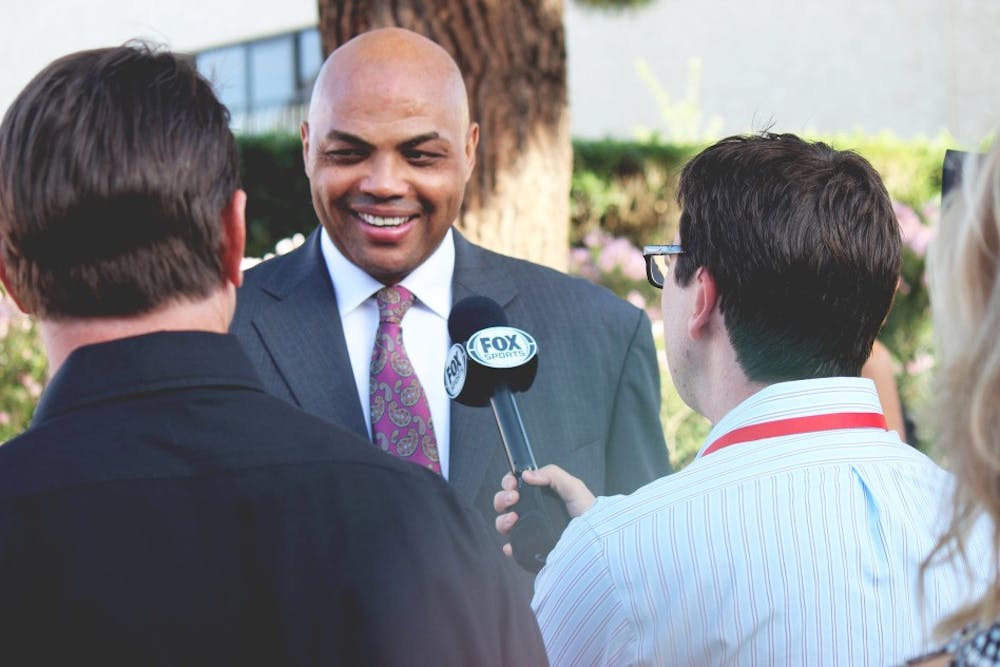Due to our inclination to idolize, many Americans believe athletes or people in positions of authority should be held to a higher moral standard than we are.
Most people seemingly consider "higher moral standard" and "my own moral standard" to be synonymous. In theory, this means that that their favorite athletes should mimic their ideals, support what they support and condemn what they condemn.
In 1993, ex-Phoenix Suns basketball player Charles Barkley said, "I'm not paid to be a role model. I'm paid to wreak havoc on the basketball court."
Most recently, Colin Kaepernick's refusal to stand for the national anthem has brought his own moral compass into question. Some may argue that his actions are casting a negative light on his team and himself.
Fans are outraged because Kaepernick doesn't agree with their personal beliefs. He doesn't think that you should always stand for the national anthem out of respect, when the country in question is in such turmoil. The people that believe he is setting a bad example for their children, other Americans or professional athletes in general are missing one thing: Kaepernick did not decide to be seen as influential – America decided he was.
Each week there is a new athlete apologizing at a press conference for standing up for what they believe in, or expressing remorse for a stumble in their personal lives. Whether or not they are actually apologetic is unknown, but regardless, they must apologize. The public has a predetermined set of standards for their favorite celebrities, and if they don't measure up — there will be hell to pay.
It is not the public's job to determine an athlete's moral obligation, but they do it anyway. Morality is subjective in that it differs among various cultures, religions and types of people. To expect any other human being's moral compass to be identical to yours is unrealistic.
Even according to Dr. Shawn E. Klein, lecturer in philosophy in the ASU School of Historical, Philosophical and Religious Studies, and creator of the blog Sports Ethicist, it would be too difficult to meticulously outline the specific moral obligations professional athletes should adhere to.
“How does an athlete know if they have discharged or met this obligation?” Klein said. “Does it mean they shouldn’t swear in public or during a game? Not use tobacco, alcohol? Does it mean always speak using proper, standard English? Speak out against racial injustice?”
Klein also questioned whether individuals in professional athletic positions agree to the responsibility that goes along with being a moral role model.
“I suppose they need to acknowledge it fairly early in their careers,” Klein said. “But again, I am not sure that public figure reality implies additional moral claims on them.”
Professional athletes do have power over their audiences. Many companies are aware of their influence on the public, and that is why endorsements and sponsorships exist. For example, Usain Bolt earned $30 million in endorsements alone in 2016.
With all of this in mind, it is important to differentiate a public figure from a role model.
Mitchell Atencio, Cronkite student and previous student assistant to the ASU football coaches, believes that it’s important to pick role models based on their actions and not necessarily their titles.
“Every person at some point in time messes up. Some ‘mess-ups’ are small and some are big and some mean more to different people than other things do,” Atencio said. “You can learn a lot from people, but don’t put your faith in them, and don’t expect them to never mess up.”
My responsibility to the company that I represent, The State Press, is to be ethical and honest to a tee. I owe no more to the company that I represent than an athlete like Colin Kaepernick owes to his team. My responsibility is not to make my readers happy, to comfort them with praise or to help them sleep at night; I am responsible for completing my work in the manner outlined in my contract. Kaepernick should not be expected to do more than that, either.
Part of being a professional athlete is just that: being professional. Like any other professional career, athletes should be expected to meet the standards of their roles. A doctor is expected to be knowledgeable in their field, a journalist is expected to be ethical and a police officer is expected to be just.
The public is not qualified to determine how and when professional athletes are punished. Athletes should be reprimanded for misrepresenting their organizations and their countries, not for being perceived as “morally unjust” people.
Reach the columnist at sphaas@asu.edu or follow @_SavannahHaas on Twitter.
Like The State Press on Facebook and follow @statepress on Twitter.
Editor’s note: The opinions presented in this column are the author’s and do not imply any endorsement from The State Press or its editors.
Want to join the conversation? Send an email to opiniondesk.statepress@gmail.com. Keep letters under 300 words and be sure to include your university affiliation. Anonymity will not be granted.




